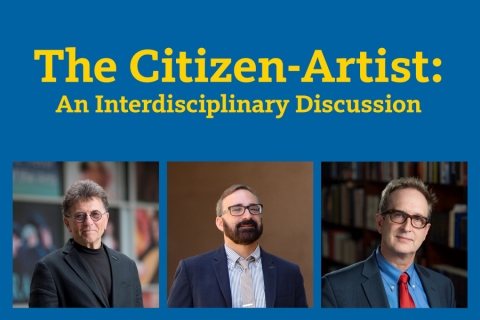The Citizen-Artist: An Interdisciplinary Discussion
The Citizen-Artist: An Interdisciplinary Discussion
Special Event
The Citizen-Artist: An Interdisciplinary Discussion
Stephen Barker, Dean, Claire Trevor School of the Arts
William M. Maurer, Dean, School of Social Sciences
Tyrus H. Miller, Dean, School of Humanities
Thursday, May 26, 2022
Noon
Winifred Smith Hall
Dean Stephen Barker presents a stimulating lecture on the citizen artist, what it means, and why it is essential in the current social climate. He will be joined for a roundtable discussion with Dean Miller from humanities and Dean Maurer from social sciences.
Free admission, reservation required
More about the subject matter:
BUILDING THE CITIZEN-ARTIST
Stephen Barker, Dean, UCI Claire Trevor School of the Arts
What does citizenship have to do with being an artist? What, in the end, does it mean to be an “artist?” To be a particular part of—even a central part of, the creation and development of culture? And there’s the key: the artist’s chief role is that, precisely, of “citizen”? Issues like these underlie all of the work we, as faculty and students, do in the Claire Trevor School of the Arts, across various arts disciplines and, more generally, as researchers, through the arts, into the complexities of culture-building. The arts are often (even in a research university) not considered to be part of, let alone central to, this process of citizenship—what I’m calling “culture-building.” But the core task of the Claire Trevor School is precisely “culture-building,” through diligent, systematic inquiry and public activity aimed at the exploration of theories and applications of the creative process to the evolution of the culture—local, national, global—of which we are part. We focus on Building the Citizen-Artist.
The fundamental materials needed for building “the citizen” and “the artist” are actually quite straightforward, and are nearly identical: both require two things: specific skills, and cultural grounding. The cliché is that the ideal artist requires what we call “talent” (which the Greeks called daimon and the Romans genius), but in fact everyone has talent, which is simply aptitude or “natural ability.” The artist becomes an artist when she employs that aptitude to the passion required to create art objects. Ideally the artist manifests special skills, but for the last century or so even skills are optional (as most television clearly shows).
The ideal citizen, on the other hand, requires a very special skill: literacy, that is, learned critical thinking skills developed through reading, writing, and substantive exchange. “Skill” is thus central to both the artist and the citizen—indeed “skill” is endemic to “art” itself: the word “art” derives from the Latin ars, which derives from the Greek tekhnē, which literally means “skill.”
And both build the culture of which they are a part: the citizen “builds” civic structures; the artist “builds” artworks. And both are performative: the arts, in all their culture’s “mirror” (showing culture what it is, for better and for worse) and as its “provoker” (through critique, showing it where it might go), The artist, like the citizen, articulates, evolves, and disseminates cultural values. To be a citizen or an artist is to be engaged; this is both formative and trans-formative, dynamic forces in the process of moving culture to its next configuration.
At the most fundamental level, it is only through this critique that we can develop fully as citizen-artists. This double task is the heart of the citizen-artist’s task. It begins with raw data from the world, in the form of images and language which, when received becomes information; Information, when it is focused, becomes knowledge. And knowledge, when it results in (and from) critical thinking, becomes hypothesis (a Greek word for opinion). Opinion is nothing more nor less than a well-constructed, informed (or ill-informed) world-view. Critical thinking distinguishes between the two—between data and information, on the one hand, and knowledge on the other; informed opinion requires engagement in critical thought. This super-structure is ubiquitous, repeated across all subjects and genres, for both the citizen and the artist. We’ll explore a few of them.
 |
NEW: Arts Events Parking Permits!! |
Please visit our secure direct giving page and make a gift to support CTSA today!

